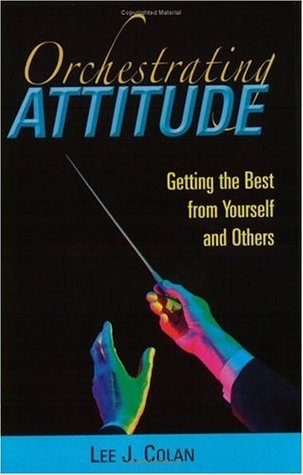More on this book
Kindle Notes & Highlights
by
Lee J. Colan
Read between
January 17 - February 1, 2020
attitude is the single most important factor in achieving success.
your attitude is something you can always control! When we control our attitude, we influence how our body responds and performs.
optimism early in life predicts good health later in life.
Tomorrow you will become what you choose today.
Our attitudes develop from repeatedly thinking speaking and acting the same way, over and over, until it becomes a stable and enduring way we behave - a habit.
Our attitude is our personal boomerang to the world - whatever we throw out will come back to us.
choice has a positive or negative consequence for us at some level.
Choosing to respond, instead of react, helps us positively orchestrate our attitudes ... and our lives.
Our thoughts today influence our results tomorrow.
we receive what we believe in life.
it is our interpretations that make a situation negative. A situation doesn’t drag us down; the way we think about it does.
Henry Ford said, “Whether you think you can or cannot, you’re right.”
Our experiences are much less important than how we choose to think about them.
When you change the way you look at things, things change the way they look.
The most successful people create their own luck by constantly checking their focus. They appear lucky because their focus has put them in the right place to make good things happen. In other words, luck is 90% preparation and 10% opportunity.
Control your input by not only visualizing your goals, but also imagining exactly how your body feels when you achieve your goal. Your mind does not know the difference between physical and mental practice. Visualization is the process that allows you to see your desired results in your mind. Once you can see it in your mind, you’ll be closer to achieving it in your life.
Once we have spoken or heard the words, they become programmed into our minds. It’s not what we say, but what we repeatedly say. The words we repeat are gradually convincing our minds that these statements are true; therefore, precluding the mind’s eye from seeing any possibility to prove our words wrong.
Words reflect our commitments to act. Our words tell the truth.
Here are three instruments for orchestrating your words: 1. Talk yourself up! 2. Speak with strength. 3. Ask the right questions.
Use your words to change your situation, not to describe it. The moment you speak something - good or bad - you give birth to it as an idea, an expectation, a desire. You have planted the seed that will, sooner or later, grow into the results you will reap.
When you’re feeling somewhat down-spirited, don’t tell people how you feel, tell them how you want to feel. By controlling what you say and how you say it - using positive words with enthusiasm - you help to change your physical and mental state.
Tell people how you want to feel and it won’t be long before you do.
Speaking with strength also creates a sense of accountability and commitment to get the best from yourself and others.
Eliminate these words from your vocabulary: • I can’t • If • Doubt • Try • I don’t think • I don’t have the time • Maybe • I’m afraid of • I don’t believe • It’s impossible.
Build positive mental connections, personal strength and commitment by using these strength builders: • I can • I will • Expect the best • Commit • I know • I will make the time • Positively • I am confident • I do believe • I do believe • All things are possible. The power of your actions is preceded by the power of your words.
The questions you ask will either limit or expand the possible responses you get.
The power of the answers you receive is directly proportionate to the power of the questions you ask.
“It is not the answer that enlightens, but the question.” - Decouvertes
“If you don’t make things happen, then things will happen to you. ” - Roman Virgil
the rewards go to those who let their actions rise above their excuses.
we judge ourselves by our intentions, but others judge us by our actions.
the next time you have a need, help someone else succeed by asking the right question. Instead of asking, “What’s in it for me?” ask the WIIFO question: “What’s in it for others?”
If you want to get the best from yourself, first give the best of yourself.
Most importantly, meeting others’ needs brings out our true spirit - it reflects our positive human character.
If you expect something in return for your help, your act of kindness is really an act of trading favors. Be a giver, not a trader.
“We make a living by what we get, but we make a life by what we give. ” - Winston Churchill
An attitude of gratitude creates happier, more resilient people.
Use your adversity as a time to pinpoint opportunities to improve,
Plan for the future but live for the present.
“When one door of happiness closes, another opens; but often we look so long at the closed door that we do not see the one which has opened for us. ” - Helen Keller
Our relationships should be the place where we act our best and give our best.
We get one chance to perform our life’s symphony.


